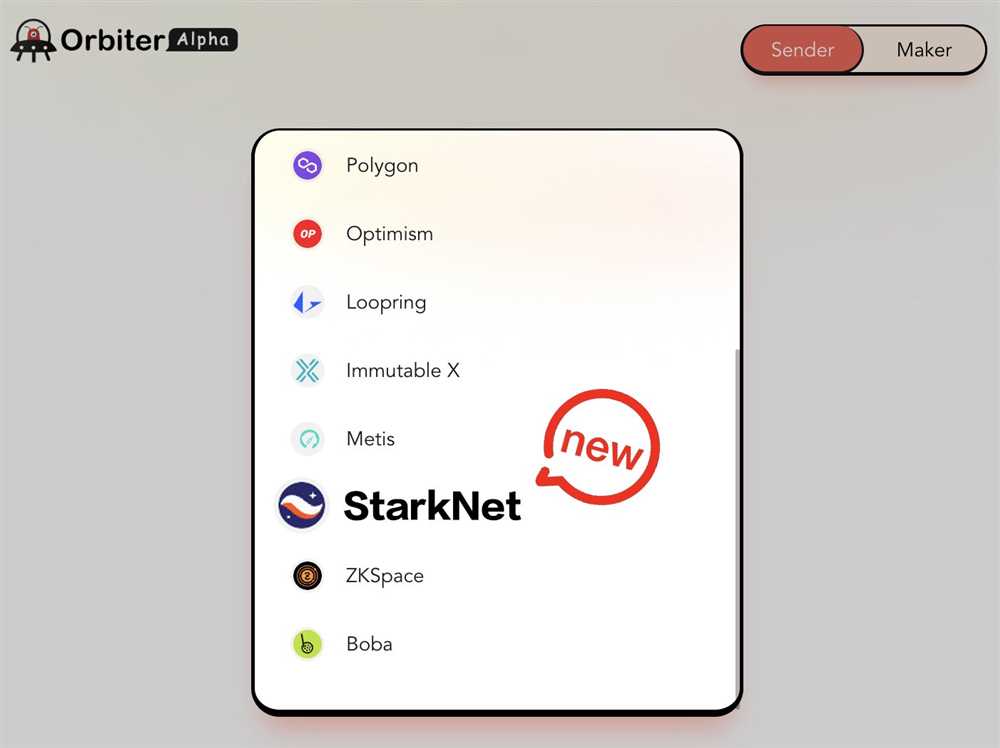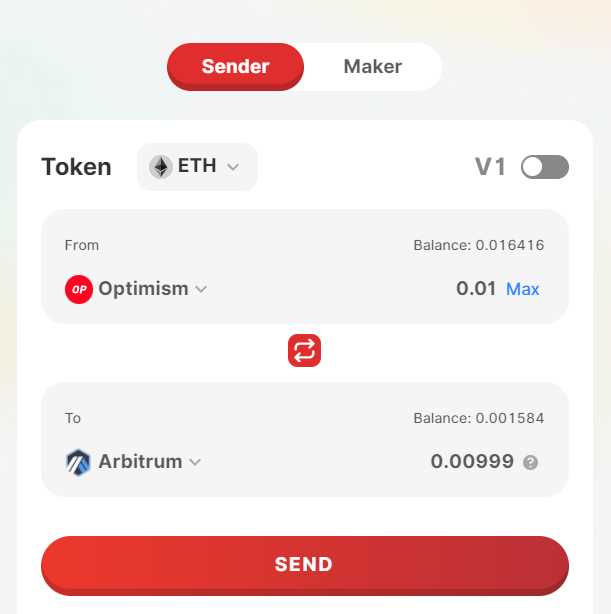
Orbiter Finance vs. the Top 5 Bridge Tokens: Comparing Key Features and Functionality

In the world of decentralized finance (DeFi), bridge tokens play a crucial role in connecting different blockchain networks. They enable seamless transfer of assets between blockchains, opening up a whole new realm of possibilities for users. Two prominent players in this space are Orbiter Finance and the top 5 bridge tokens, namely Chainlink, Polkadot, Cardano, Ethereum, and Binance Smart Chain. In this article, we will compare the key features and functionality of Orbiter Finance with these popular bridge tokens.
Orbiter Finance: Orbiter Finance is a next-generation bridge token that aims to revolutionize cross-chain interoperability. Built on a robust and secure infrastructure, Orbiter Finance provides users with a seamless bridge between various blockchain networks. With its innovative technology, Orbiter Finance is designed to ensure fast and secure transactions, low fees, and a user-friendly interface.
Chainlink: Chainlink is a decentralized oracle network that provides reliable and tamper-proof data feeds to smart contracts. While it does not function exclusively as a bridge token, it plays a vital role in connecting different blockchains by securely transferring data between them. Chainlink’s decentralized nature and robust security features make it a popular choice for developers and users alike.
Polkadot: Polkadot is a multi-chain platform that allows different blockchains to interoperate and share their unique features. It provides a scalable, secure, and decentralized solution for transferring assets between blockchains. With its innovative design and interoperability features, Polkadot has gained significant traction in the blockchain industry.
Cardano: Cardano is a blockchain platform that aims to provide a secure and scalable infrastructure for the development of decentralized applications and smart contracts. While it does not function solely as a bridge token, Cardano’s technology enables seamless transfer of assets between different blockchains. Its focus on security and scalability has made it a popular choice among developers and users.
Ethereum: Ethereum is the second largest blockchain platform after Bitcoin. It revolutionized the DeFi space by introducing smart contracts, which allow users to create and execute programmable agreements without the need for intermediaries. While Ethereum has its own bridge token solutions, it faces challenges with scalability and high fees, which has opened the door for competitors like Orbiter Finance.
Binance Smart Chain: Binance Smart Chain is a blockchain platform developed by the cryptocurrency exchange Binance. It aims to provide fast and low-cost transactions, making it an attractive choice for users. While Binance Smart Chain has its own bridge token solutions, it does not offer the same level of decentralization as Orbiter Finance.
In conclusion, Orbiter Finance stands out in the crowded market of bridge tokens with its innovative technology, fast and secure transactions, low fees, and user-friendly interface. While Chainlink, Polkadot, Cardano, Ethereum, and Binance Smart Chain all offer their own unique features and functionalities, Orbiter Finance aims to revolutionize cross-chain interoperability and bring seamless connectivity between various blockchain networks.
Overview

In this article, we will compare Orbiter Finance with the top 5 bridge tokens in the DeFi space. Bridge tokens serve as a crucial bridge between different blockchain networks, allowing users to transfer assets seamlessly.
Orbiter Finance is an innovative DeFi project that aims to disrupt the way assets are transferred between blockchains. It leverages its own native token, ORBT, to provide a seamless and secure cross-chain transfer experience.
In this comparison, we will analyze the key features and functionalities of Orbiter Finance and the top 5 bridge tokens: Ethereum Bridge, Binance Smart Chain Bridge, Polkadot Bridge, Solana Bridge, and Avalanche Bridge.
We will explore the technology behind each bridge token, their interoperability capabilities, transaction speeds, security measures, and user experience. By examining these factors, we aim to provide an in-depth analysis of the strengths and weaknesses of each project.
Furthermore, we will discuss the use cases and potential applications of Orbiter Finance and the top 5 bridge tokens. We will examine their compatibility with various blockchain networks and the potential benefits they offer to users.
Through this comparison, readers will gain a comprehensive understanding of Orbiter Finance and the top 5 bridge tokens in the market. It will serve as a guide for investors and users who are looking to navigate the rapidly evolving landscape of blockchain interoperability.
Key Features of Orbiter Finance

Orbiter Finance is a decentralized finance (DeFi) platform that offers a range of key features for its users. These features make it stand out from other bridge tokens and provide unique benefits to its users.
1. Cross-Chain Compatibility

Orbiter Finance is designed to be compatible with multiple blockchains, allowing users to seamlessly transfer assets between different networks. This cross-chain compatibility enables users to access a wide range of decentralized applications (dApps) and financial services across different platforms.
2. Trustless Bridge Technology

Orbiter Finance utilizes trustless bridge technology, which ensures the security and transparency of asset transfers. The bridge allows users to send their assets from one blockchain to another without relying on a centralized intermediary. This decentralized approach enhances the overall trustworthiness of the platform.
3. Flexible Asset Management
With Orbiter Finance, users have the ability to manage their assets in a flexible and efficient manner. The platform supports various asset types, including cryptocurrencies, stablecoins, and other digital assets. Users can easily track and manage their holdings, allowing for greater control and optimization of their investment strategies.
4. Yield Farming and Staking

Orbiter Finance offers yield farming and staking opportunities for its users, allowing them to earn passive income on their holdings. Users can participate in liquidity farming pools and stake their assets to earn rewards. This incentivizes active participation in the platform and provides additional benefits for token holders.
5. Community Governance
Orbiter Finance is governed by its community of token holders, who have the power to propose and vote on platform upgrades and changes. This decentralized governance ensures that the platform evolves in a way that aligns with the collective interests of its users.
Overall, Orbiter Finance provides a comprehensive set of features that are designed to enhance the user experience and enable seamless cross-chain asset transfers. Its trustless bridge technology, flexible asset management options, yield farming opportunities, and community governance make it a compelling choice for DeFi enthusiasts.
Key Features of Top 5 Bridge Tokens
Ethereum Bridge Token (ETHB)

The Ethereum Bridge Token (ETHB) is designed to facilitate seamless transactions and interoperability between different blockchain networks. It allows users to transfer assets from the Ethereum network to other supported networks, such as Binance Smart Chain or Polygon, and vice versa.
Some key features of the ETHB token include:
| Fungibility | ETHB tokens are interchangeable with each other, meaning that each token holds the same value and can be used interchangeably. |
| Decentralization | The ETHB token operates on decentralized blockchain networks, ensuring security, transparency, and immutability of transactions. |
| Liquidity | ETHB tokens can be easily traded on various decentralized exchanges, providing liquidity and enabling users to easily access and utilize their assets on different networks. |
Bitcoin Bridge Token (BTCB)

The Bitcoin Bridge Token (BTCB) is a cross-chain bridge token that represents Bitcoin on other blockchain networks. It allows users to bring Bitcoin from the Bitcoin network to other networks, such as the Ethereum network, and use it in decentralized applications or smart contracts.
Some key features of the BTCB token include:
| Cross-Chain Compatibility | BTCB tokens are compatible with multiple blockchain networks, enabling seamless interoperability between different ecosystems. |
| Security | BTCB leverages the security of the Bitcoin network, ensuring the safe transfer and storage of Bitcoin assets on other supported networks. |
| Scalability | BTCB tokens can be used in various decentralized applications and smart contracts, enabling developers to build scalable and innovative solutions on different blockchain networks. |
Polkadot Bridge Token (DOTB)

The Polkadot Bridge Token (DOTB) is a token that represents assets on the Polkadot network and allows users to transfer them to other compatible networks. It enables cross-chain transactions and interoperability between different blockchain networks.
Some key features of the DOTB token include:
| Interoperability | DOTB tokens can be used to transfer assets between different interconnected blockchains, enhancing the interoperability and connectivity of blockchain ecosystems. |
| Governance | DOTB holders have the ability to participate in the governance of the Polkadot network, allowing them to vote on important protocol upgrades and decisions. |
| Adaptability | DOTB tokens can adapt to changes in the Polkadot network, allowing for seamless integration with new features and upgrades. |
Cardano Bridge Token (ADAB)

The Cardano Bridge Token (ADAB) is a token designed to facilitate the transfer of assets from the Cardano blockchain to other supported networks. It enables cross-chain interoperability and seamless integration between different blockchain ecosystems.
Some key features of the ADAB token include:
| Secure and Efficient Transactions | ADAB token transactions are secure and efficient, ensuring the safe transfer of assets between different blockchain networks. |
| Smart Contract Support | ADAB tokens can be used in smart contracts on other supported networks, enabling the development of decentralized applications and innovative solutions. |
| Community Governance | The ADAB token allows holders to participate in the governance of the Cardano ecosystem, giving them voting rights and the ability to shape the future of the network. |
Ripple Bridge Token (XRPB)
The Ripple Bridge Token (XRPB) is a token that represents Ripple assets on other blockchain networks, enabling cross-chain interoperability and seamless transfer of assets between different ecosystems.
Some key features of the XRPB token include:
| Fast and Low-Cost Transactions | XRPB token transactions are fast and low-cost, allowing for quick and affordable transfers of Ripple assets on other supported networks. |
| Liquidity | XRPB tokens can be easily traded on various decentralized exchanges, providing liquidity and making it easy for users to access and utilize their Ripple assets on different networks. |
| Decentralization | XRPB operates on decentralized blockchain networks, ensuring security, transparency, and immutability of transactions. |
Functionality Comparison

In this section, we will compare the key features and functionality of Orbiter Finance and the top 5 bridge tokens.
| Feature | Orbiter Finance | Bridge Token 1 | Bridge Token 2 | Bridge Token 3 | Bridge Token 4 | Bridge Token 5 |
|---|---|---|---|---|---|---|
| Asset Transfer | Yes | Yes | Yes | Yes | Yes | Yes |
| Multi-Chain Support | Yes | Yes | No | Yes | No | Yes |
| Cross-Chain Swap | Yes | No | Yes | No | No | Yes |
| Smart Contract Integration | Yes | Yes | Yes | No | Yes | Yes |
| Liquidity Pool | Yes | Yes | No | Yes | No | No |
As shown in the table above, Orbiter Finance offers asset transfers, multi-chain support, cross-chain swaps, smart contract integration, and liquidity pools, making it a comprehensive solution for bridging tokens across different blockchains. While some of the bridge tokens also offer these features, not all of them provide the same level of functionality. It’s important to consider these differences when choosing a bridge token for your specific use case.
Q&A:
What is Orbiter Finance?
Orbiter Finance is a decentralized finance (DeFi) protocol built on the Ethereum blockchain. It aims to provide users with various financial services such as lending, borrowing, and trading.
How does Orbiter Finance compare to other bridge tokens?
Orbiter Finance stands out among other bridge tokens due to its unique features and functionality. Unlike traditional bridge tokens, Orbiter Finance offers a more diversified range of services, including lending, borrowing, and trading. Additionally, it operates on the Ethereum blockchain, providing users with a decentralized and secure platform.


